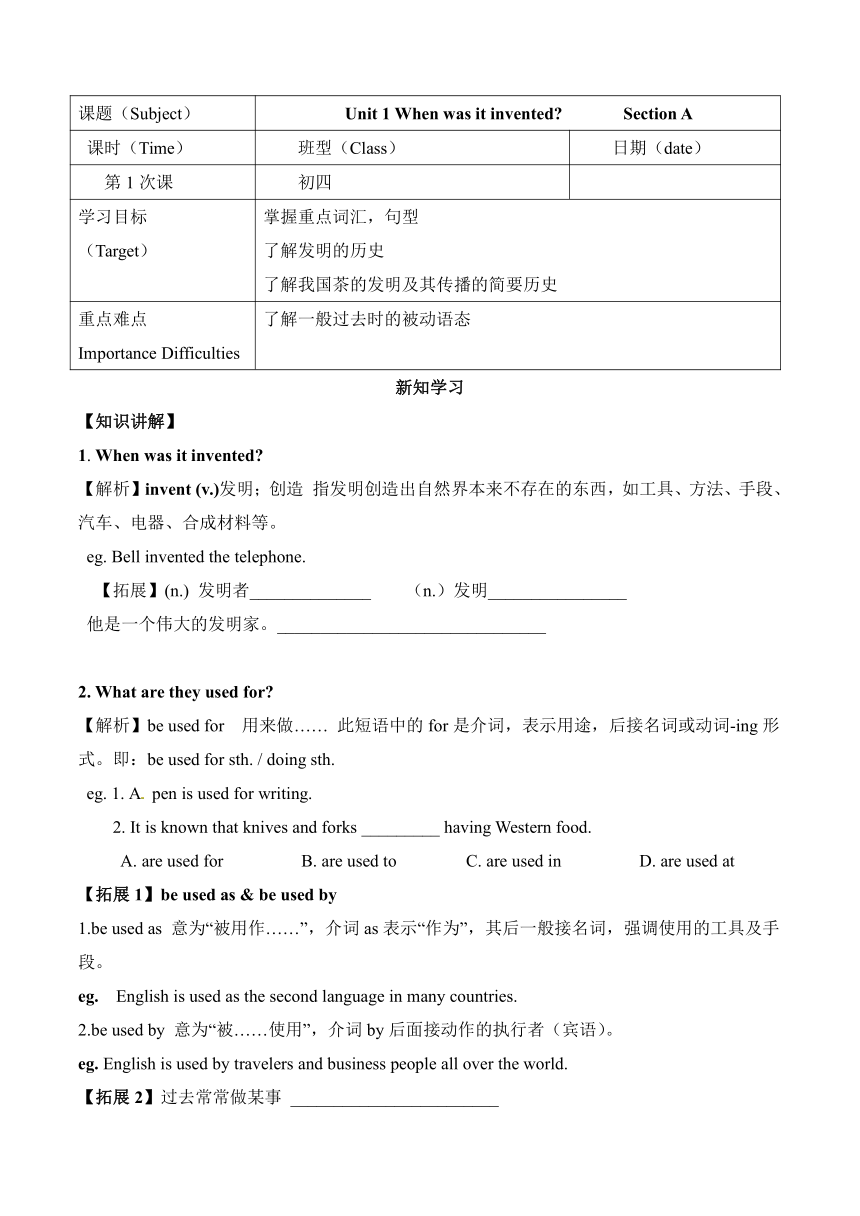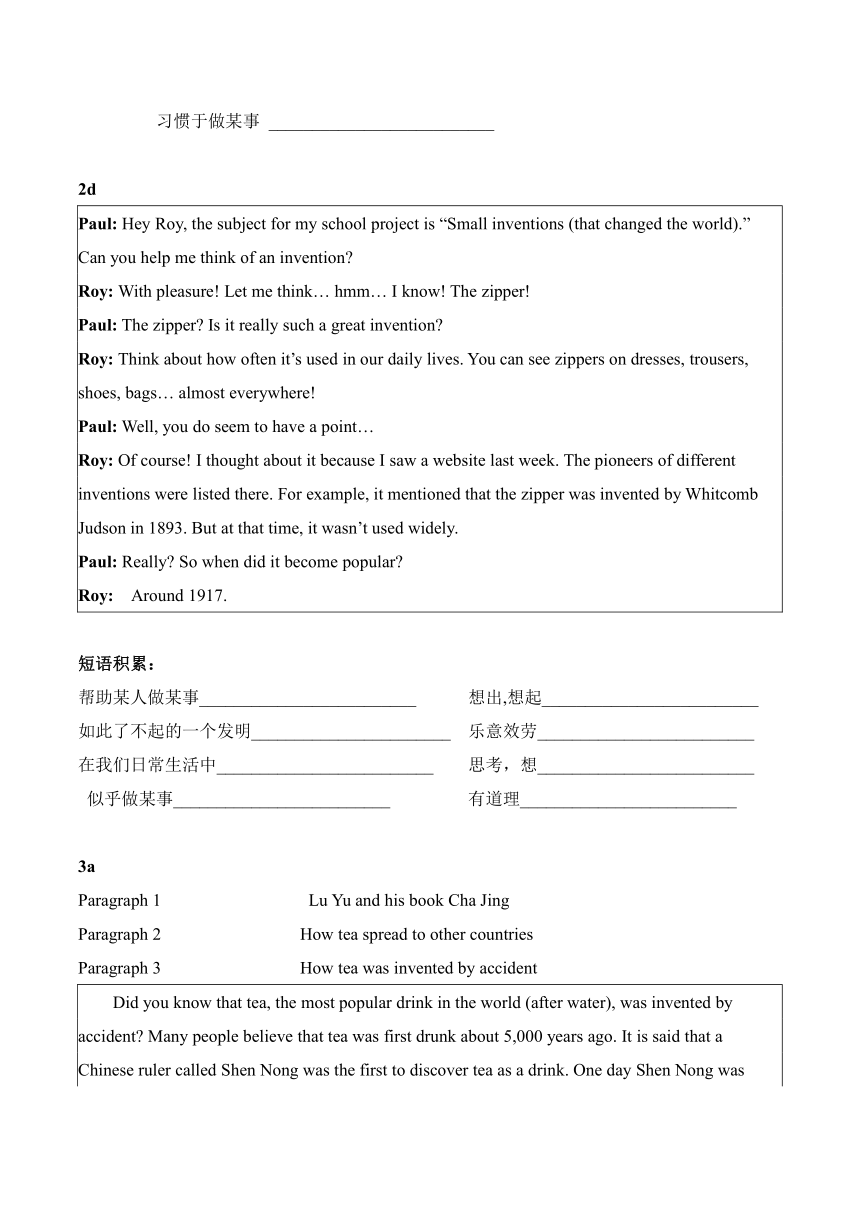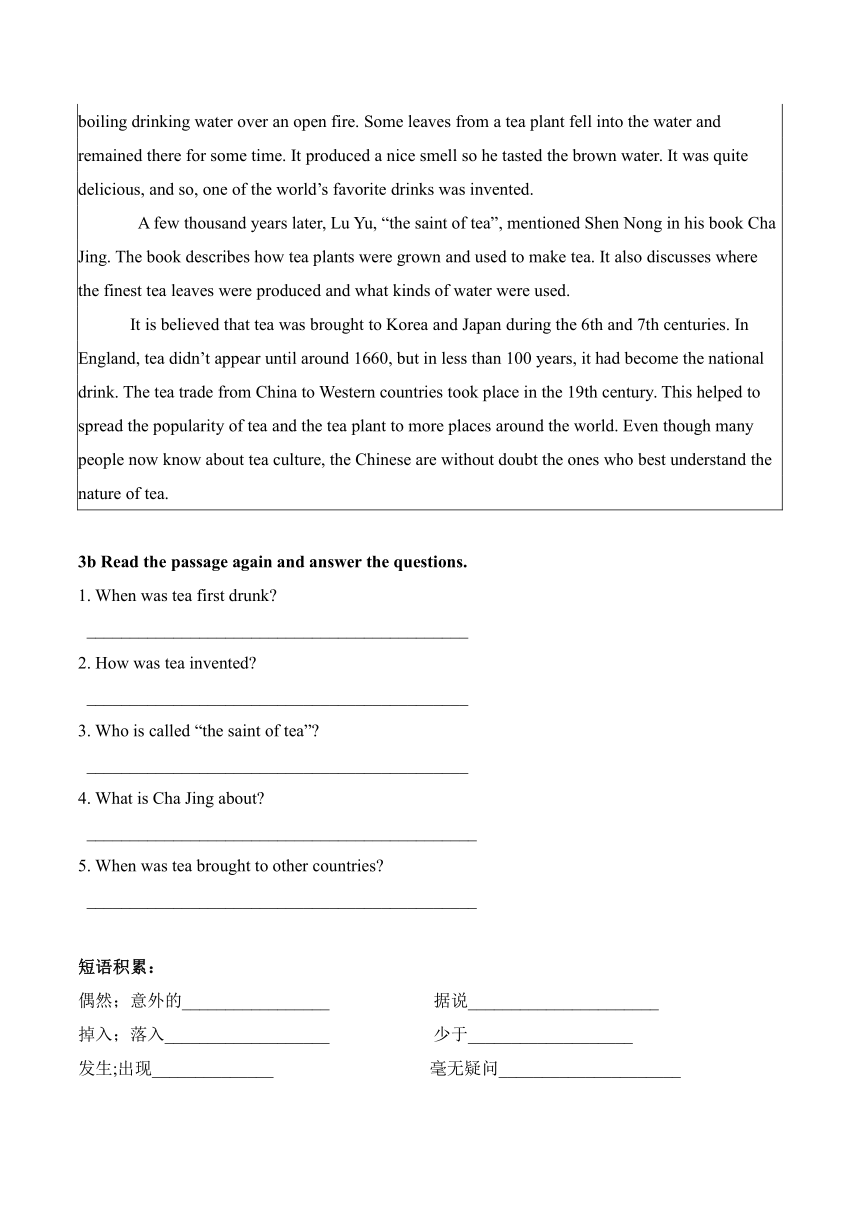Unit 1 When was it invented? Section A 知识点讲义 鲁教版(五四学制)九年级英语全册
文档属性
| 名称 | Unit 1 When was it invented? Section A 知识点讲义 鲁教版(五四学制)九年级英语全册 |  | |
| 格式 | docx | ||
| 文件大小 | 34.8KB | ||
| 资源类型 | 教案 | ||
| 版本资源 | 鲁教版 | ||
| 科目 | 英语 | ||
| 更新时间 | 2024-02-07 14:56:30 | ||
图片预览



文档简介
课题(Subject) Unit 1 When was it invented Section A
课时(Time) 班型(Class) 日期(date)
第1次课 初四
学习目标 (Target) 掌握重点词汇,句型 了解发明的历史 了解我国茶的发明及其传播的简要历史
重点难点 Importance Difficulties 了解一般过去时的被动语态
新知学习
【知识讲解】
1. When was it invented
【解析】invent (v.)发明;创造 指发明创造出自然界本来不存在的东西,如工具、方法、手段、汽车、电器、合成材料等。
eg. Bell invented the telephone.
【拓展】(n.) 发明者______________ (n.)发明________________
他是一个伟大的发明家。_______________________________
2. What are they used for
【解析】be used for 用来做…… 此短语中的for是介词,表示用途,后接名词或动词-ing形式。即:be used for sth. / doing sth.
eg. 1. A pen is used for writing.
2. It is known that knives and forks _________ having Western food.
A. are used for B. are used to C. are used in D. are used at
【拓展1】be used as & be used by
1.be used as 意为“被用作……”,介词as表示“作为”,其后一般接名词,强调使用的工具及手段。
eg. English is used as the second language in many countries.
2.be used by 意为“被……使用”,介词by后面接动作的执行者(宾语)。
eg. English is used by travelers and business people all over the world.
【拓展2】过去常常做某事 ________________________
习惯于做某事 __________________________
2d
Paul: Hey Roy, the subject for my school project is “Small inventions (that changed the world).”
Can you help me think of an invention
Roy: With pleasure! Let me think… hmm… I know! The zipper!
Paul: The zipper Is it really such a great invention
Roy: Think about how often it’s used in our daily lives. You can see zippers on dresses, trousers, shoes, bags… almost everywhere!
Paul: Well, you do seem to have a point…
Roy: Of course! I thought about it because I saw a website last week. The pioneers of different inventions were listed there. For example, it mentioned that the zipper was invented by Whitcomb Judson in 1893. But at that time, it wasn’t used widely.
Paul: Really So when did it become popular
Roy: Around 1917.
短语积累:
帮助某人做某事_________________________ 想出,想起_________________________
如此了不起的一个发明_______________________ 乐意效劳_________________________ 在我们日常生活中_________________________ 思考,想_________________________
似乎做某事_________________________ 有道理_________________________
3a
Paragraph 1 Lu Yu and his book Cha Jing
Paragraph 2 How tea spread to other countries
Paragraph 3 How tea was invented by accident
Did you know that tea, the most popular drink in the world (after water), was invented by accident Many people believe that tea was first drunk about 5,000 years ago. It is said that a Chinese ruler called Shen Nong was the first to discover tea as a drink. One day Shen Nong was boiling drinking water over an open fire. Some leaves from a tea plant fell into the water and remained there for some time. It produced a nice smell so he tasted the brown water. It was quite delicious, and so, one of the world’s favorite drinks was invented.
A few thousand years later, Lu Yu, “the saint of tea”, mentioned Shen Nong in his book Cha Jing. The book describes how tea plants were grown and used to make tea. It also discusses where the finest tea leaves were produced and what kinds of water were used.
It is believed that tea was brought to Korea and Japan during the 6th and 7th centuries. In England, tea didn’t appear until around 1660, but in less than 100 years, it had become the national drink. The tea trade from China to Western countries took place in the 19th century. This helped to spread the popularity of tea and the tea plant to more places around the world. Even though many people now know about tea culture, the Chinese are without doubt the ones who best understand the nature of tea.
3b Read the passage again and answer the questions.
1. When was tea first drunk
____________________________________________
2. How was tea invented
____________________________________________
3. Who is called “the saint of tea”
____________________________________________
4. What is Cha Jing about
_____________________________________________
5. When was tea brought to other countries
_____________________________________________
短语积累:
偶然;意外的_________________ 据说______________________
掉入;落入___________________ 少于___________________
发生;出现______________ 毫无疑问_____________________
茶贸易____________________ 全世界_________________
即使___________________ 了解_________________
【知识讲解】
It is said that a Chinese ruler called Shen Nong was the first to discover tea as a drink.
【解析1】It is said that…意思是“据说……”
结构:It +be +过去分词 + that 从句是一个固定搭配的句型,it是形式主语,真正的主语是后面的that从句。。
例如: 据说玛丽在伦敦是非常幸福的。
It is said that Mary is very happy in London. (主语从句)
【拓展】
1. It is believed that… 人们认为…… 2. It is supposed that… 据猜测…… 3. It is reported that… 据报道…… 4. It’s known that… 众所周知……
例:It is believed that on December 21st, 1981, the first basketball game in history was played.
人们相信历史上首次篮球比赛是在1891年12月21日举行的。
It is supposed that there is no life on the moon.
据推测月球上是没有生命的。
It is reported that another earth satellite has been put into orbit.
据报道又有一颗卫星上天了。
【及时练习】
1. 据说,一只老虎从动物园里跑了出来。
_______ ________ _________ _______ a tiger escaped from the zoo.
2. It __________ (know) that the computer is useful.
【解析2】【妙辨异同】invent/ discover/ find (out) “发明、发现”
invent 意为“发明;创造”,主要指发明一种世界上原本不存在的东西
discover 意为“发现”,指发现一种世界上原本已存在,后来才被人们认识到的东西
find (out) find 意为“发现;找到” 强调找的结果;find out意为“找出;发现;查明”指通过观察
【练习】
1. -Do you know who invented the telephone?
-No ,I only know it _____in 1876.
A. invented B. was invented C. invents
2.哥伦布于1492年发现了美洲。
Columbus _____________ America in 1492.
2. remain (v.) 保持;剩余;残余
【解析】remain意为“停留,留下”,相当于stay。“呆在那里”可以说remain / stay there,但“呆在家里”只能说stay (at) home。
eg. She remains in the house all these days. 她这些天一直呆在那栋房子里。
【拓展】remain作连系动词
remain用作连系动词,意为“保持(某种状态),继续存在,仍旧是”,后面接形容词,名词,分词,不定式或介词短语。
eg. She remained sitting when they came in.
他们进来时,她仍然坐着(没有站起来)。
eg. Peter became a manager but John remained a worker.
彼得当上了经理,但约翰仍是一个工人。
eg. Whatever great progress you have made, you should remain modest.
无论你取得了多么大的进步,你都应一直保持谦虚。
3. In England, tea didn’t appear until around 1660, but…
【解析】not.. until 意为“只到…才…
eg. He didn’t leave until I felt better.只到我感觉好点了,她才离开。
until 作介词,后接时间名词,在句中作时间状语。
作连词,后接从句,引导时间状语从句。
eg: She stayed there until 9 o’clock. 她一直等到9点钟。
We waited until the rain stopped. 我们等到雨停了。
(2) until用在肯定句中,多与连续性的动词连用。如:stand/wait/stay等,表示主句动作的终止时间。
(3) until可用于否定句中,即not…until…意为“直到……才”,常与非延续性动词连用。如:open/start/leave/arrive等,强调主句动作开始的时间。
例如:The child didn’t go to bed until his father came back.
直到父亲回来,那个孩子才睡觉。
随堂练习
一.词汇
The new nation needed a modern-minded ____________ (rule) .
______________(煮 ) the rice for 20 minutes and you can eat it.
After the strong wind in late autumn, only a few leaves r____________on the tree.
He did not____________(提到,说道)the quarrel with his wife.
They produced cars that run on e_________________
The food ____________ (发出......气味) terrible, we shouldn’t eat it
I like the color of this coat but I don’t like its s____________.
It’s my great____________ (高兴)to have a talk with you.
The little inventions have helped me a lot in my____________ (day)life.
My mother always l____________ all things that she wants to buy before shopping.
二.单项选择
( )1.Who was the book ________
write B.wrote C.written D.written by
( )2.Kites ________ messages in the war in the past.
were used for sending B.were used to sending
C.are used for sending D.are used to sending
( )3.Can you tell me ________ the train was invented
what B.who C.when D.which
( )4.—________ do you have a class meeting —Once a week.
How old B.How far C.How often D.How long
( )5.—Who helped Li Lei with his English
—________. He learnt it by himself.
A.Anybody B.Somebody C.Nobody D.Everybody
课后作业
一.完形填空
In your schoolbags, you may have pencils, some kinds of pens, rulers and some books. 1 of these things grow in the fields. They were all 2 in factories. And, of course, they were 3 by some people. There have not always been pencils or pens, rulers or books. Thousands of years ago, no one 4 about these things. Even the 5 invention has the greatest technological advance at its time. Who invented them first How did they have such clever 6 We don't always know. There have been thousands of inventions, large and small in the human history. Some of these inventions have greatly 7 the world, such a s paper, printing, radios, telephones and computers, and we know the inventors. But we have forgotten most of the other inventors. 8 invented the clock, for example, or the lock to the door We don't know. There have been thousands of inventors and we should be grateful to them for their clever ideas. New ideas are 9 . They can change our lives. Without inventions, we would still live in forests, with nothing to wear and no ice cream to eat. Will you be one of them when you 10
A. None B. Each C. Any D. All
A. make B. makes C. made D. to make
A. invent B. invented C. invention D. inventor
A. came B. knew C. set D. worried
A. old B. wonderful C. huge D. simple
A. ideas B. idea C. a idea D. an idea
A. traveled B. made C. changed D. destroyed
A. How B. Who C. When D. Which
A. crazy B. wrong C. important D. unimportant
20. A. put up B. look up C. set up D. grow up
课时(Time) 班型(Class) 日期(date)
第1次课 初四
学习目标 (Target) 掌握重点词汇,句型 了解发明的历史 了解我国茶的发明及其传播的简要历史
重点难点 Importance Difficulties 了解一般过去时的被动语态
新知学习
【知识讲解】
1. When was it invented
【解析】invent (v.)发明;创造 指发明创造出自然界本来不存在的东西,如工具、方法、手段、汽车、电器、合成材料等。
eg. Bell invented the telephone.
【拓展】(n.) 发明者______________ (n.)发明________________
他是一个伟大的发明家。_______________________________
2. What are they used for
【解析】be used for 用来做…… 此短语中的for是介词,表示用途,后接名词或动词-ing形式。即:be used for sth. / doing sth.
eg. 1. A pen is used for writing.
2. It is known that knives and forks _________ having Western food.
A. are used for B. are used to C. are used in D. are used at
【拓展1】be used as & be used by
1.be used as 意为“被用作……”,介词as表示“作为”,其后一般接名词,强调使用的工具及手段。
eg. English is used as the second language in many countries.
2.be used by 意为“被……使用”,介词by后面接动作的执行者(宾语)。
eg. English is used by travelers and business people all over the world.
【拓展2】过去常常做某事 ________________________
习惯于做某事 __________________________
2d
Paul: Hey Roy, the subject for my school project is “Small inventions (that changed the world).”
Can you help me think of an invention
Roy: With pleasure! Let me think… hmm… I know! The zipper!
Paul: The zipper Is it really such a great invention
Roy: Think about how often it’s used in our daily lives. You can see zippers on dresses, trousers, shoes, bags… almost everywhere!
Paul: Well, you do seem to have a point…
Roy: Of course! I thought about it because I saw a website last week. The pioneers of different inventions were listed there. For example, it mentioned that the zipper was invented by Whitcomb Judson in 1893. But at that time, it wasn’t used widely.
Paul: Really So when did it become popular
Roy: Around 1917.
短语积累:
帮助某人做某事_________________________ 想出,想起_________________________
如此了不起的一个发明_______________________ 乐意效劳_________________________ 在我们日常生活中_________________________ 思考,想_________________________
似乎做某事_________________________ 有道理_________________________
3a
Paragraph 1 Lu Yu and his book Cha Jing
Paragraph 2 How tea spread to other countries
Paragraph 3 How tea was invented by accident
Did you know that tea, the most popular drink in the world (after water), was invented by accident Many people believe that tea was first drunk about 5,000 years ago. It is said that a Chinese ruler called Shen Nong was the first to discover tea as a drink. One day Shen Nong was boiling drinking water over an open fire. Some leaves from a tea plant fell into the water and remained there for some time. It produced a nice smell so he tasted the brown water. It was quite delicious, and so, one of the world’s favorite drinks was invented.
A few thousand years later, Lu Yu, “the saint of tea”, mentioned Shen Nong in his book Cha Jing. The book describes how tea plants were grown and used to make tea. It also discusses where the finest tea leaves were produced and what kinds of water were used.
It is believed that tea was brought to Korea and Japan during the 6th and 7th centuries. In England, tea didn’t appear until around 1660, but in less than 100 years, it had become the national drink. The tea trade from China to Western countries took place in the 19th century. This helped to spread the popularity of tea and the tea plant to more places around the world. Even though many people now know about tea culture, the Chinese are without doubt the ones who best understand the nature of tea.
3b Read the passage again and answer the questions.
1. When was tea first drunk
____________________________________________
2. How was tea invented
____________________________________________
3. Who is called “the saint of tea”
____________________________________________
4. What is Cha Jing about
_____________________________________________
5. When was tea brought to other countries
_____________________________________________
短语积累:
偶然;意外的_________________ 据说______________________
掉入;落入___________________ 少于___________________
发生;出现______________ 毫无疑问_____________________
茶贸易____________________ 全世界_________________
即使___________________ 了解_________________
【知识讲解】
It is said that a Chinese ruler called Shen Nong was the first to discover tea as a drink.
【解析1】It is said that…意思是“据说……”
结构:It +be +过去分词 + that 从句是一个固定搭配的句型,it是形式主语,真正的主语是后面的that从句。。
例如: 据说玛丽在伦敦是非常幸福的。
It is said that Mary is very happy in London. (主语从句)
【拓展】
1. It is believed that… 人们认为…… 2. It is supposed that… 据猜测…… 3. It is reported that… 据报道…… 4. It’s known that… 众所周知……
例:It is believed that on December 21st, 1981, the first basketball game in history was played.
人们相信历史上首次篮球比赛是在1891年12月21日举行的。
It is supposed that there is no life on the moon.
据推测月球上是没有生命的。
It is reported that another earth satellite has been put into orbit.
据报道又有一颗卫星上天了。
【及时练习】
1. 据说,一只老虎从动物园里跑了出来。
_______ ________ _________ _______ a tiger escaped from the zoo.
2. It __________ (know) that the computer is useful.
【解析2】【妙辨异同】invent/ discover/ find (out) “发明、发现”
invent 意为“发明;创造”,主要指发明一种世界上原本不存在的东西
discover 意为“发现”,指发现一种世界上原本已存在,后来才被人们认识到的东西
find (out) find 意为“发现;找到” 强调找的结果;find out意为“找出;发现;查明”指通过观察
【练习】
1. -Do you know who invented the telephone?
-No ,I only know it _____in 1876.
A. invented B. was invented C. invents
2.哥伦布于1492年发现了美洲。
Columbus _____________ America in 1492.
2. remain (v.) 保持;剩余;残余
【解析】remain意为“停留,留下”,相当于stay。“呆在那里”可以说remain / stay there,但“呆在家里”只能说stay (at) home。
eg. She remains in the house all these days. 她这些天一直呆在那栋房子里。
【拓展】remain作连系动词
remain用作连系动词,意为“保持(某种状态),继续存在,仍旧是”,后面接形容词,名词,分词,不定式或介词短语。
eg. She remained sitting when they came in.
他们进来时,她仍然坐着(没有站起来)。
eg. Peter became a manager but John remained a worker.
彼得当上了经理,但约翰仍是一个工人。
eg. Whatever great progress you have made, you should remain modest.
无论你取得了多么大的进步,你都应一直保持谦虚。
3. In England, tea didn’t appear until around 1660, but…
【解析】not.. until 意为“只到…才…
eg. He didn’t leave until I felt better.只到我感觉好点了,她才离开。
until 作介词,后接时间名词,在句中作时间状语。
作连词,后接从句,引导时间状语从句。
eg: She stayed there until 9 o’clock. 她一直等到9点钟。
We waited until the rain stopped. 我们等到雨停了。
(2) until用在肯定句中,多与连续性的动词连用。如:stand/wait/stay等,表示主句动作的终止时间。
(3) until可用于否定句中,即not…until…意为“直到……才”,常与非延续性动词连用。如:open/start/leave/arrive等,强调主句动作开始的时间。
例如:The child didn’t go to bed until his father came back.
直到父亲回来,那个孩子才睡觉。
随堂练习
一.词汇
The new nation needed a modern-minded ____________ (rule) .
______________(煮 ) the rice for 20 minutes and you can eat it.
After the strong wind in late autumn, only a few leaves r____________on the tree.
He did not____________(提到,说道)the quarrel with his wife.
They produced cars that run on e_________________
The food ____________ (发出......气味) terrible, we shouldn’t eat it
I like the color of this coat but I don’t like its s____________.
It’s my great____________ (高兴)to have a talk with you.
The little inventions have helped me a lot in my____________ (day)life.
My mother always l____________ all things that she wants to buy before shopping.
二.单项选择
( )1.Who was the book ________
write B.wrote C.written D.written by
( )2.Kites ________ messages in the war in the past.
were used for sending B.were used to sending
C.are used for sending D.are used to sending
( )3.Can you tell me ________ the train was invented
what B.who C.when D.which
( )4.—________ do you have a class meeting —Once a week.
How old B.How far C.How often D.How long
( )5.—Who helped Li Lei with his English
—________. He learnt it by himself.
A.Anybody B.Somebody C.Nobody D.Everybody
课后作业
一.完形填空
In your schoolbags, you may have pencils, some kinds of pens, rulers and some books. 1 of these things grow in the fields. They were all 2 in factories. And, of course, they were 3 by some people. There have not always been pencils or pens, rulers or books. Thousands of years ago, no one 4 about these things. Even the 5 invention has the greatest technological advance at its time. Who invented them first How did they have such clever 6 We don't always know. There have been thousands of inventions, large and small in the human history. Some of these inventions have greatly 7 the world, such a s paper, printing, radios, telephones and computers, and we know the inventors. But we have forgotten most of the other inventors. 8 invented the clock, for example, or the lock to the door We don't know. There have been thousands of inventors and we should be grateful to them for their clever ideas. New ideas are 9 . They can change our lives. Without inventions, we would still live in forests, with nothing to wear and no ice cream to eat. Will you be one of them when you 10
A. None B. Each C. Any D. All
A. make B. makes C. made D. to make
A. invent B. invented C. invention D. inventor
A. came B. knew C. set D. worried
A. old B. wonderful C. huge D. simple
A. ideas B. idea C. a idea D. an idea
A. traveled B. made C. changed D. destroyed
A. How B. Who C. When D. Which
A. crazy B. wrong C. important D. unimportant
20. A. put up B. look up C. set up D. grow up
同课章节目录
- Unit 1 When was it invented?
- Section A
- Section B
- Unit 2 Teenagers should be allowed to choose their
- Section A
- Section B
- Unit 3 It must belong to Carla.
- Section A
- Section B
- Unit 4 I like music that I can dance to.
- Section A
- Section B
- Unit 5 You’re supposed to shake hands.
- Section A
- Section B
- Unit 6 Sad movies make me cry.
- Section A
- Section B
- Unit 7 Life is full of the unexpected.
- Section A
- Section B
- Unit 8 We're trying to save the earth!
- Section A
- Section B
- Unit 9 It's important to have good habits.
- Section A
- Section B
- Unit 10 I remember meeting all of you in Grade 6.
- Section A
- Section B
